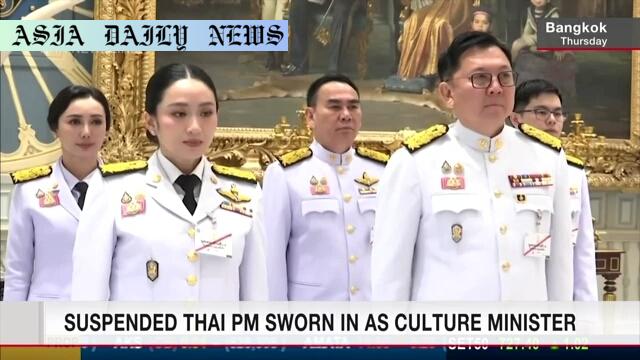Suspended PM Thailand’s culture minister Paetongtarn Shinawatra sworn in amid court probe and shifting premiership dynamics.

Introduction: Thailand’s Political Landscape in Transition
Thailand’s political scenario has taken an intriguing and complex turn with the recent suspension of Prime Minister Paetongtarn Shinawatra. In an unprecedented development, Paetongtarn, despite her suspension, has been sworn in as the nation’s new culture minister. This shift comes amidst a controversial investigation over her alleged conduct in connection to a leaked phone call with Cambodian Senate President Hun Sen. Her suspension by the Thai Constitutional Court adds a new chapter to the country’s ongoing political drama, placing her premiership under scrutiny. As the Constitutional Court deliberates on her fate, her ministerial appointment raises questions about governance, political strategy, and the role of judicial intervention in Thailand’s democracy.
Paetongtarn Shinawatra’s Rise and Ongoing Investigation
Paetongtarn’s suspension stems from her alleged involvement in a sensitive and possibly inappropriate phone conversation with Cambodia’s Senate President, Hun Sen. This matter sparked national concern, leading to judicial intervention. The court’s decision to suspend her reflects the gravity of the allegations. However, her continued role in the cabinet as a culture minister reveals a strategic maneuver by the ruling Pheu Thai Party to maintain its political grounding during uncertain times. Paetongtarn’s ability to attend cabinet meetings in her new capacity could influence government decisions, even as her possible removal looms over the political horizon. Meanwhile, the Constitutional Court is thoroughly examining the case, with a verdict expected in approximately a month or longer, leaving Thailand in a period of suspense and reflection.
Deputy Prime Minister Phumtham Wechayachai’s Role as Acting PM
In the midst of this political upheaval, Deputy Prime Minister Phumtham Wechayachai has stepped in as the acting prime minister. Phumtham’s appointment underscores the importance of maintaining stability in governance as the Pheu Thai Party continues to hold a thin parliamentary majority in its coalition government. Phumtham inherits a challenging role: to navigate Thailand’s intense political climate, oversee key cabinet decisions, and provide strong leadership while awaiting clarity on Paetongtarn’s case. The country’s political and economic stability largely hinges on how effectively he manages this temporary position, balancing the expectations of the ruling coalition and the scrutinizing Thai public.
Implications for Thai Politics and Governance
The series of events unfolding in Thailand has far-reaching implications for the country’s politics and governance. Paetongtarn’s new role as culture minister post-suspension raises questions about the boundaries of power and the use of ministerial positions to stabilize political turmoil temporarily. Simultaneously, Deputy PM Phumtham’s leadership during this period will be closely monitored, as it could set a precedent for managing crisis situations. Furthermore, the Constitutional Court’s eventual ruling may redefine the scope of judicial power in political matters and could influence future decisions about political accountability in Thailand. These developments highlight the delicate balance between executive power, judicial oversight, and public trust in the evolving democratic framework of Thailand.
Conclusion: The Road Ahead for Thailand
With the court’s final verdict on Paetongtarn’s premiership still pending, Thailand faces a crucial phase in its democratic journey. The political and judicial institutions must navigate this situation with prudence, ensuring decisions align with the principles of good governance and public accountability. This moment in Thailand’s history underscores the resilience of its democratic processes amid challenges, offering lessons in leadership, strategy, and institutional checks and balances. Whether the court affirms or overturns Paetongtarn’s suspension, the outcome will leave an indelible mark on the nation’s political trajectory, setting new norms for leadership and governance in the years ahead.
Commentary
Paetongtarn Shinawatra’s New Role: A Strategic Pivot?
The political journey of Paetongtarn Shinawatra has undoubtedly taken a fascinating turn. Her assumption of the culture minister post, despite being suspended as prime minister, is both a strategic decision by the ruling Pheu Thai Party and a bold personal move. This development raises pertinent questions: Is this an attempt to retain her influence, or is it a way to respectably sideline her amidst ongoing investigations? Either way, her new role as a minister reminds us that political maneuvering often operates within grey areas in the world of governance. Paetongtarn’s ability to attend cabinet meetings as culture minister further complicates the dynamics, adding layers to what is already a politically charged atmosphere in Thailand.
Thailand’s Judicial Oversight in Political Affairs
Another critical aspect of this situation is the role of the judiciary. The Constitutional Court’s decision to suspend Paetongtarn highlights the increasing intervention of judicial bodies in Southeast Asian politics. While this is ostensibly to uphold democratic integrity, it does raise debates about judicial reach and its potential influence on executive decision-making. For Thailand, this moment is a pivotal test of its institutional framework – a balance between judicial accountability and executive autonomy needs to be struck to maintain public trust.
The Leadership Challenge for Acting PM Phumtham
For Acting Prime Minister Phumtham Wechayachai, this moment presents a litmus test. Taking over under such circumstances is no easy feat. Yet, his temporary role offers him the chance to establish credibility not just within his party but among the Thai electorate. It will be interesting to see how he navigates the challenges of leading a coalition with a narrow majority while addressing the economic and social concerns of the populace. His leadership during this period could either stabilize or further destabilize the political equilibrium.
Final Thoughts
Thailand’s current political scenario is a stark reminder of the complexities of governance in a democracy. Paetongtarn’s future, Phumtham’s leadership, and the court’s ultimate decision are all variables in this unfolding political equation. While uncertainties abound, one thing remains clear: the nation’s democratic resilience is undergoing a significant test. How Thailand emerges from this will shape its governance model and democratic processes in the years to come. As an observer, one can only hope that these challenges lead to stronger institutions and a more robust political culture for the country.


